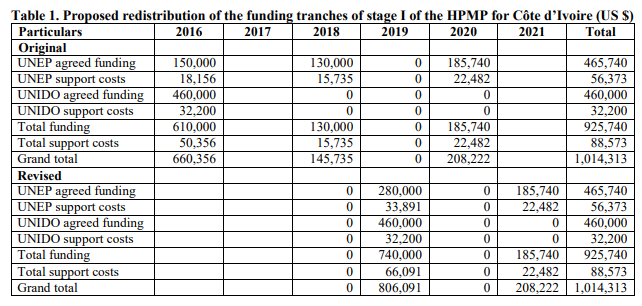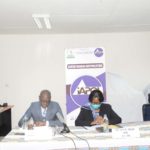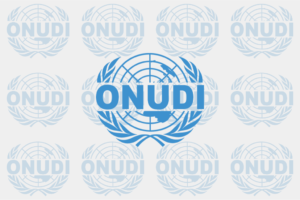
UNITED NATIONS INDUSTRIAL DEVELOPMENT ORGANIZATION
TERMS OF REFERENCE FOR PERSONNEL UNDER INDIVIDUAL SERVICE AGREEMENT (ISA)
Côte d’Ivoire HPMP Stage I Tranche 3 (120512)
| Title: | National consultant on Montreal Protocol |
| Main Duty Station and Location: | Home based in Abidjan or other cities, Côte d’Ivoire |
| Mission/s to: | To be separately arranged, if any |
| Start of Contract (EOD): | 1 February 2021 |
| End of Contract (COB): | 31 December 2021 |
| Number of Working Days: | 11 work months |
Organizational context
The United Nations Industrial Development Organization (UNIDO) is the specialized agency of the United Nations that promotes industrial development for poverty reduction, inclusive globalization and environmental sustainability. The mission of UNIDO, as described in the Lima Declarationadopted at the fifteenth session of the UNIDO General Conference in 2013, is to promote and accelerate inclusive and sustainable industrial development (ISID) in Member States. The relevance of ISID as an integrated approach to all three pillars of sustainable development is recognized by the 2030 Agenda for Sustainable Development and the related Sustainable Development Goals (SDGs), which will frame United Nations and country efforts towards sustainable development in the next fifteen years. UNIDO’s mandate is fully recognized in SDG-9, which calls to “Build resilient infrastructure, promote inclusive and sustainable industrialization and foster innovation”. The relevance of ISID, however, applies in greater or lesser extent to all SDGs. Accordingly, the Organization’s programmatic focus is structured in four strategic priorities: Creating shared prosperity; Advancing economic competitiveness; Safeguarding the environment; and Strengthening knowledge and institutions.
Each of these programmatic fields of activity contains a number of individual programmes, which are implemented in a holistic manner to achieve effective outcomes and impacts through UNIDO’s four enabling functions: (i) technical cooperation; (ii) analytical and research functions and policy advisory services; (iii) normative functions and standards and quality-related activities; and (iv) convening and partnerships for knowledge transfer, networking and industrial cooperation. Such core functions are carried out in Departments/Offices in its Headquarters, Regional Offices and Hubs and Country Offices.
Environment Department (EAE/ENV)
The Directorate of Environment and Energy (EAE) aims to integrate and scale-up the energy and environment activities focusing on supporting governments and industries to provide sustainable and resilient soft and hard infrastructure for industrial development, supporting industries to contribute to climate neutral circular economy, and supporting governments and industries in fulfilling national commitments under multinational climate and environmental agreements. The Directorate consists of the Department of Environment and the Department of Energy.
The present assignment is within Montreal Protocol Division (MPD) of the Department of Environment (ENV) and the incumbent reports to the project manager in EAE/ENV/MPD. The Montreal Protocol Division is responsible for assisting developing countries and countries with economies in transition to achieve the objectives of the Montreal Protocol on Substances that Deplete the Ozone Layer of the Vienna Convention for the Protection of the Ozone Layer, and to help these countries comply with the provisions of this protocol. It does so by, inter alia, assisting the governments of these countries in the preparation and implementation of policies, strategies and national and sectoral programmes. The Division oversees and manages all aspects of technical cooperation programmes and interventions, which fall under the auspices and funding of the Montreal Protocol. It acts as an implementing agency of the Multilateral Fund for the Implementation of the Montreal Protocol, representing UNIDO at meetings of the Executive Committee with the purpose of submitting projects for approval, and of reporting on achievements, inter‐agency coordination, and dealing with compliance‐related issues.
Project context
The third and fourth tranches of the Hydrochlorofluorocarbon (HFCFs) Phase-out Management Plan (HPMP or PGEH in French) have been approved at the 84th Executive Committee of the Montreal Protocol (EXCOM).
In order to accelerate the implementation of stage I and meet the compliance targets under its
Agreement with the Executive Committee, the Government of Côte d’Ivoire has requested to combine the third and fourth funding tranches and to extend the completion date of the Agreement from 2020 to 2021. Table 1 shows the funding tranche distribution as originally approved and as modified.

Strengthening of centres of excellence located in two large cities (Yamoussoukro and San Pedro) and major refrigeration service workshops with the provision of additional basic equipment and service tools to training centres and refrigeration workshops (e.g., recovery units, leak detectors, refrigerant identifiers, brazing and welding units, vacuum pumps, manifolds and tool sets); this will include technical support and training of technicians and trainers (UNIDO).
The national consultant is expected to carry out the following tasks in close consultation with UNIDO project manager, other international and national consultants, the National Ozone Office, beneficiary companies, and other stakeholders.
| MAIN DUTIES | Concrete/ measurable Outputs to be achieved | Expected duration | Location |
| Plan and update the list of the training centres for refrigeration and air-conditioning (RAC) courses | A list of the training centres updated including locations, contact information, directors’ names, names of RAC courses, number of students (female/male) per course. | Continuous | Home based |
| Designing and carrying out surveys on existing equipment and equipment to be procured in consultation with NOU | A list of existing equipment and equipment to be procured created as a result of surveys sent to the identified training centres | ||
| Develop video training materials on how to use the equipment purchased by the project particularly on how to handle flammable (A2L and A3) refrigerants and identifiers | Video training materials on how to use the equipment purchased by the project particularly on how to handle flammable (A2L and A3) refrigerants and identifiers |
REQUIRED COMPETENCIES
Core Values
WE LIVE AND ACT WITH INTEGRITY: work honestly, openly and impartially.
WE SHOW PROFESSIONALISM: work hard and competently in a committed and responsible manner.
WE RESPECT DIVERSITY: work together effectively, respectfully and inclusively, regardless of our differences in culture and perspective.
Key Competencies
WE FOCUS ON PEOPLE: cooperate to fully reach our potential –and this is true for our colleagues as well as our clients. Emotional intelligence and receptiveness are vital parts of our UNIDO identity.
WE FOCUS ON RESULTS AND RESPONSIBILITIES: focus on planning, organizing and managing our work effectively and efficiently. We are responsible and accountable for achieving our results and meeting our performance standards. This accountability does not end with our colleagues and supervisors, but we also owe it to those we serve and who have trusted us to contribute to a better, safer and healthier world.
WE COMMUNICATE AND EARN TRUST: communicate effectively with one another and build an environment of trust where we can all excel in our work.
WE THINK OUTSIDE THE BOX AND INNOVATE: To stay relevant, we continuously improve, support innovation, share our knowledge and skills, and learn from one another.
Managerial and Leadership Competencies (as applicable)
WE ARE STRATEGIC, DECISIVE, PRINCIPLED AND INSPIRATIONAL: As managers, we are strategic and fair in driving our team’s performance. As leaders, we are a source of inspiration, stand for norms and standards established in the UN Charter and duty bound to defend these ideals with a principled approach.
WE ARE INCLUSIVE AND ACCOUNTABLE: As managers, we are inclusive in our approach and maintain constructive engagement with all our stakeholders. As leaders, we embrace all personnel and stakeholders and are accountable mutually within UNIDO, within the system, to beneficiaries and the public and beyond.
WE ARE MULTI-DIMENSIONAL AND TRANSFORMATIONAL: As managers, we go beyond conventional methods to help our organizational units strengthen their own agility and adaptability to change. As leaders in the UN system, we have a vision which is integrated and engaged across the pillars of Peace and Security, Human Rights and Development.
WE ARE COLLABORATIVE AND CO-CREATIVE: As managers, we foster a team spirit and create meaningful opportunities to hear the voices of those around us, while realizing that only by working together can we accomplish our mission. As leaders we see the inter-dependency of imperatives of the UN Charter and personally champion a collaborative inter-agency, multi-stakeholders and cross-thinking approach.
MINIMUM ORGANIZATIONAL REQUIREMENTS
Education: Advanced university degree in engineering, science or other relevant discipline.
Technical and Functional Experience:
A minimum of 5 years practical experience in the field of refrigeration, air conditioning and other Montreal Protocol sector, including experience at the international level involving technical cooperation in developing countries.
Languages: Fluency in written and spoken French is required. Fluency and/or working knowledge of another official UN language, particularly English required.
Mail to : monlolamonglai@gmail.com


